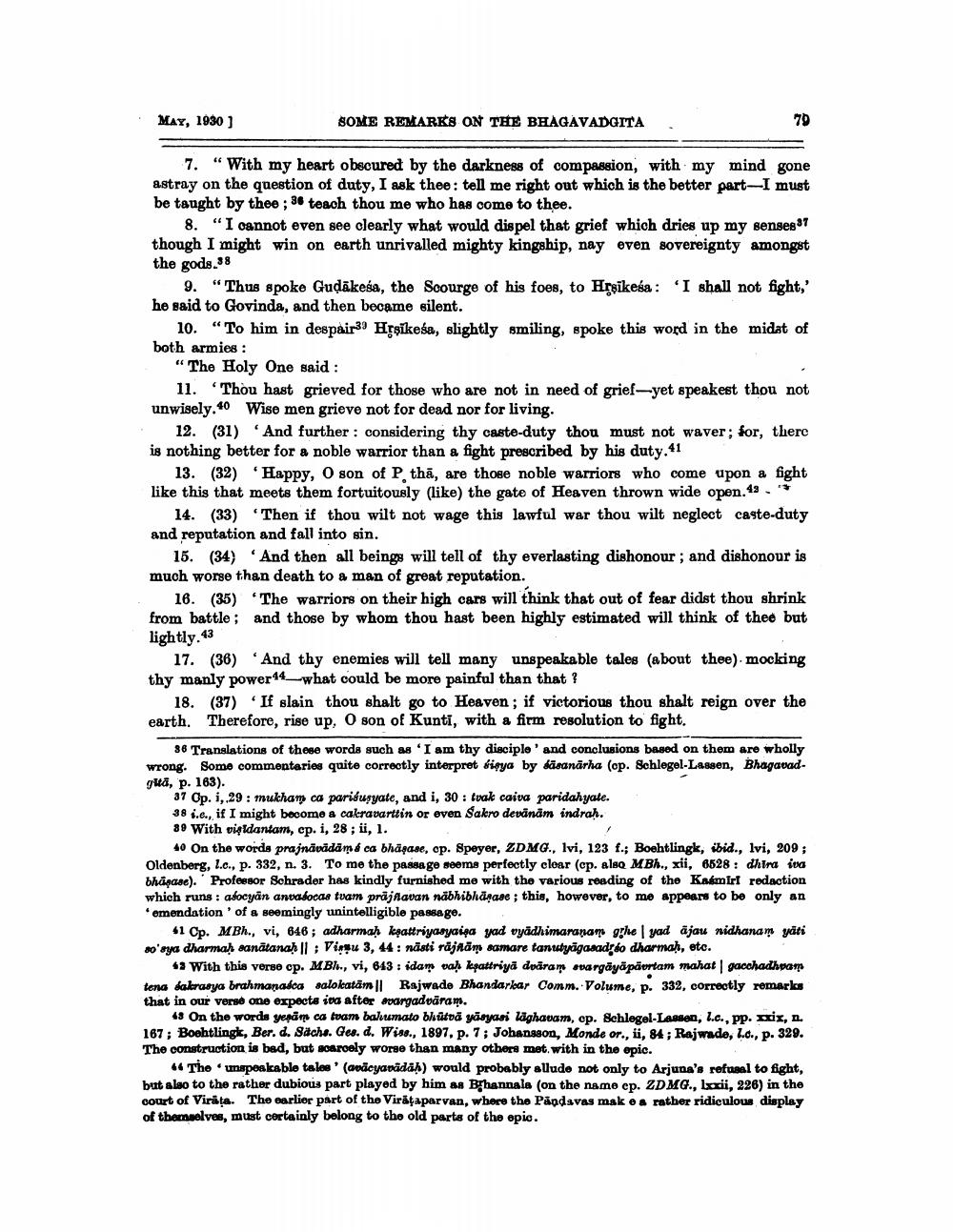________________
MAY, 1930)
SOME REMARKS ON THE BHAGAVADGITA
7. "With my heart obscured by the darkness of compassion, with my mind gone astray on the question of duty, I ask thee: tell me right out which is the better part-I must be taught by thee ; 38 teach thou me who has come to thee.
8. "I cannot even see clearly what would dispel that grief which dries up my senses 37 though I might win on earth unrivalled mighty kingship, nay even sovereignty amongst the gods.38
9. "Thus spoke Gudākeša, the Scourge of his foes, to Hrsikeśa: 'I shall not fight,' he said to Govinda, and then became silent.
10. "To him in despair39 Hrşikeśa, slightly smiling, spoke this word in the midat of both armies :
"The Holy One said :
11. Thou hast grieved for those who are not in need of grief--yet speakest thou not unwisely.40 Wise men grieve not for dead nor for living.
12. (31) And further : considering thy caste-duty thou must not waver; for, there is nothing better for a noble warrior than a fight prescribed by his duty.41
13. (32) Happy, 0 son of P thā, are those noble warriors who come upon a fight like this that meets them fortuitously (like) the gate of Heaven thrown wide open.43. '*
14. (33) Then if thou wilt not wage this lawful war thou wilt neglect caste-duty and reputation and fall into sin.
15. (34) And then all beings will tell of thy everlasting dishonour; and dishonour is much worse than death to a man of great reputation.
16. (35) The warriors on their high cars will think that out of fear didst thou shrink from battle; and those by whom thou hast been highly estimated will think of thee but lightly.43
17. (36) "And thy enemies will tell many unspeakable tales (about thee) mocking thy manly power 44_what could be more painful than that?
18. (37) If slain thou shalt go to Heaven; if victorious thou shalt reign over the earth. Therefore, rise up, O son of Kunti, with a firm resolution to fight.
88 Translations of these words such as 'I am thy disciple' and conclusions based on them are wholly wrong. Somo commentarios quite correctly interpret bigya by säsanärha (op. Schlegel-Lassen, Bhagavadgua, p. 163).
37 Op. i, 29 : mukham ca parióusyate, and i, 30 : tvak caiva paridahyale. 38.e., if I might become a cakravarttin or even Sakro devānam indrah. 89 With vişidantam, cp. i, 28 ; ii, 1.
40 On the words prajnāvādāmáca bhäşase, op. Speyer, ZDMG., Ivi, 123 f.; Boehtlingk, ibid., lvi, 209; Oldenberg, 1.c., p. 332, n. 3. To me the passage seems perfectly cloar (cp. also MBh., xii, 6528 : dhira iva bhāgase). Professor Schrader has kindly furnished me with the various reading of the Kasmir redaction which runs : afocyan anvabocas tuam prajflavan näbhibhanase ; this, however, to me appears to be only an * emendation of a seemingly unintelligible passage.
41 Cp. MBh., vi, 646; adharmaḥ kṣattriyasyaiça yad vyādhimaranam gihe yad ajau nidhanam yati 80'sya dharmaḥ sanātanah || ; Visu 3, 44: nästi räjnām samare tanutyagasad do dharmah, etc.
13 With this verse cp. MBM., vi, 643 : idam van kşattriyā dpõram svargāyāpāortam mahat gacchadh an tena sakrasya brahmanasca salokatām|| Rajwade Bhandarkar Comm. Volume, p. 332, correctly remarks that in our verse one expecte ina after svargadväram.
43 On the words venim ca tvam balumato bhutvā yāsyari laghavam, op. Schlegel-Larsen, I.c., pp. xxix, n. 187. Boehtlingk, Ber. d. Sache. Ges. d. Wiss., 1897, p. 7; Johansson, Monde or.. ii, 84 ; Rajwade, 1.c., p. 329. The construction is bad, but soaroely worse than many others met with in the opic.
4* The unspeakable talee' (arãeyapädan) would probably allude not only to Arjuna's refusal to fight, but also to the rather dubious part played by him an Bihannala (on the namo ep. ZDMG., lxxii, 226) in the court of Virata. The earlier part of the Virataparvan, where the Pandavas mak oa rather ridiculous display of themselves, must certainly belong to the old parts of the epic.




